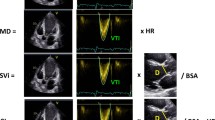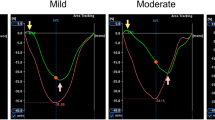Abstract
Purpose
Conventional echocardiography may not detect subtle cardiac dysfunction of septic patients. Two-dimensional left ventricular (LV) global peak systolic longitudinal strain (GLS) can detect early cardiac dysfunction. We sought to determine the prognostic value of GLS for septic shock patients admitted to intensive care units (ICUs).
Methods
We prospectively included 111 ICU patients with septic shock. A full medical history was recorded for each patient, and LV systolic function, including GLS, was measured. Our endpoints were ICU and hospital mortality.
Results
The ICU and hospital mortalities were 31.5 % (n = 35) and 35.1 % (n = 39), respectively. There was no significant difference in LV ejection fraction of the non-survivors and the survivors; however, upon ICU admission, the non-survivors exhibited GLSs that were less negative than those of the survivors, which indicated worse LV systolic function. GLS of −13 % presented the best sensitivity and specificity in the prediction of mortality (area under the curve 0.79). The patients with GLS ≥ −13 % exhibited higher ICU and hospital mortality rates (hazard ratio 4.34, p < 0.001 and hazard ratio 4.21, p < 0.001, respectively). Cox regression analyses revealed that higher Acute Physiology and Chronic Health Evaluation (APACHE) II scores and less negative GLSs were independent predictors of ICU and hospital mortalities. GLS was found to add prognostic information to the APACHE II score.
Conclusions
These findings suggest that combining GLS and the APACHE II score has additive value in the prediction of ICU and hospital mortalities and that GLS may help in early identification of high-risk septic shock patients in ICU.



Similar content being viewed by others
References
Citerio G, Bakker J, Bassetti M, Benoit D, Cecconi M, Curtis JR, Hernandez G, Herridge M, Jaber S, Joannidis M, Papazian L, Peters M, Singer P, Smith M, Soares M, Torres A, Vieillard-Baron A, Timsit JF, Azoulay E (2014) Year in review in Intensive Care Medicine 2013: I. Acute kidney injury, ultrasound, hemodynamics, cardiac arrest, transfusion, neurocritical care, and nutrition. Intensive Care Med 40:147–159
Vieillard-Baron A (2011) Septic cardiomyopathy. Ann Intensive Care 1:6
Zanotti-Cavazzoni SL, Hollenberg SM (2009) Cardiac dysfunction in severe sepsis and septic shock. Curr Opin Crit Care 15:392–397
Ammann P, Fehr T, Minder EI, Günter C, Bertel O (2001) Elevation of troponin I in sepsis and septic shock. Intensive Care Med 27:965–969
Giroir BP, Stromberg D (2000) Myocardial depression versus myocardial destruction: integrating the multiple mechanisms of myocardial dysfunction during sepsis. Crit Care Med 28:3111–3112
Ognibene FP, Cunnion RE (1993) Mechanisms of myocardial depression in sepsis. Crit Care Med 21:6–8
Rudiger A, Singer M (2007) Mechanisms of sepsis-induced cardiac dysfunction. Crit Care Med 35:1599–1608
Siddiqui Y, Crouser ED, Raman SV (2013) Nonischemic myocardial changes detected by cardiac magnetic resonance in critical care patients with sepsis. Am J Respir Crit Care Med 188:1037–1039
Abdel-Hady HE, Matter MK, El-Arman MM (2012) Myocardial dysfunction in neonatal sepsis: a tissue doppler imaging study. Pediatr Crit Care Med 13:318–323
Liu YW, Tsai WC, Su CT, Lin CC, Chen JH (2009) Evidence of left ventricular systolic dysfunction detected by automated function imaging in patients with heart failure and preserved left ventricular ejection fraction. J Card Fail 15:782–789
Basu S, Frank LH, Fenton KE, Sable CA, Levy RJ, Berger JT (2012) Two-dimensional speckle tracking imaging detects impaired myocardial performance in children with septic shock, not recognized by conventional echocardiography. Pediatr Crit Care Med 13:259–264
Basu S, Frank LH, Fenton KE, Sable CA, Levy RJ, Berger JT (2011) Left ventricular systolic strain in chronic kidney disease and hemodialysis patients. Am J Nephrol 33:84–90
Kalam K, Otahal P, Marwick TH (2014) Prognostic implications of global LV dysfunction: a systematic review and meta-analysis of global longitudinal strain and ejection fraction. Heart 100(21):1673–1680
Mignot A, Donal E, Zaroui A, Reant P, Salem A, Hamon C, Monzy S, Roudaut R, Habib G, Lafitte S (2010) Global longitudinal strain as a major predictor of cardiac events in patients with depressed left ventricular function: a multicenter study. J Am Soc Echocardiogr 23:1019–1024
Liu YW, Su CT, Sung JM, Wang SP, Su YR, Yang CS, Tsai LM, Chen JH, Tsai WC (2013) Association of left ventricular longitudinal strain with mortality among stable hemodialysis patients with preserved left ventricular ejection fraction. Clin J Am Soc Nephrol 8:1564–1574
Dellinger RP, Levy MM, Rhodes A, Annane D, Gerlach H, Opal SM, Sevransky JE, Sprung CL, Douglas IS, Jaeschke R, Osborn TM, Nunnally ME, Townsend SR, Reinhart K, Kleinpell RM, Angus DC, Deutschman CS, Machado FR, Rubenfeld GD, Webb S, Beale RJ, Vincent JL, Moreno R (2013) Surviving Sepsis Campaign: international guidelines for management of severe sepsis and septic shock. Intensive Care Med 39:165–228
Lang RM, Bierig M, Devereux RB, Flachskampf FA, Foster E, Pellikka PA, Picard MH, Roman MJ, Seward J, Shanewise JS, Solomon SD, Spencer KT, Sutton MS, Stewart WJ (2005) Recommendations for chamber quantification: a report from the American Society of Echocardiography’s guidelines and standards committee and the chamber quantification writing group, developed in conjunction with the European Association of echocardiography, a branch of the European Society of Cardiology. J Am Soc Echocardiogr 18:1440–1463
Mor-Avi V, Lang RM, Badano LP, Belohlavek M, Cardim NM, Derumeaux G, Galderisi M, Marwick T, Nagueh SF, Sengupta PP, Sicari R, Smiseth OA, Smulevitz B, Takeuchi M, Thomas JD, Vannan M, Voigt JU, Zamorano JL (2011) Current and evolving echocardiographic techniques for the quantitative evaluation of cardiac mechanics: ASE/EAE consensus statement on methodology and indications endorsed by the Japanese Society of Echocardiography. J Am Soc Echocardiogr 24:277–313
McLean AS (2012) Down but not out: myocardial depression in sepsis. Crit Care 16:132
Zhang H, Wang HY, Bassel-Duby R, Maass DL, Johnston WE, Horton JW, Tao W (2007) Role of interleukin-6 in cardiac inflammation and dysfunction after burn complicated by sepsis. Am J Physiol Heart Circ Physiol 292:H2408–H2416
Supinski GS, Callahan LA (2006) Hemin prevents cardiac and diaphragm mitochondrial dysfunction in sepsis. Free Radic Biol Med 40:127–137
Celes MR, Torres-Dueñas D, Prado CM, Campos EC, Moreira JE, Cunha FQ, Rossi MA (2010) Increased sarcolemmal permeability as an early event in experimental septic cardiomyopathy: a potential role for oxidative damage to lipids and proteins. Shock 33:322–331
Takasu O, Gaut JP, Watanabe E, To K, Fagley RE, Sato B, Jarman S, Efimov IR, Janks DL, Srivastava A, Bhayani SB, Drewry A, Swanson PE, Hotchkiss RS (2013) Mechanisms of cardiac and renal dysfunction in patients dying of sepsis. Am J Respir Crit Care Med 187:509–517
Zang QS, Martinez B, Yao X, Maass DL, Ma L, Wolf SE, Minei JP (2012) Sepsis-induced cardiac mitochondrial dysfunction involves altered mitochondrial-localization of tyrosine kinase Src and tyrosine phosphatase SHP2. PLoS One 7:e43424
Fuller BM, Mohr NM, Graetz TJ, Lynch IP, Dettmer M, Cullison K, Coney T, Gogineni S, Gregory R (2015) The impact of cardiac dysfunction on acute respiratory distress syndrome and mortality in mechanically ventilated patients with severe sepsis and septic shock: an observational study. J Crit Care 30:65–70
Fernandes CJ Jr, Akamine N, Knobel E (2008) Myocardial depression in sepsis. Shock 30(Suppl 1):14–17
Rossi MA, Celes MR, Prado CM, Saggioro FP (2007) Myocardial structural changes in long-term human severe sepsis/septic shock may be responsible for cardiac dysfunction. Shock 27:10–18
Burns AT, La Gerche A, D’hoopge J, Maclsaac AI, Prior DL (2010) Left ventricular strain and strain rate: characterization of the effect of load in human subjects. Eur J Echocardiogr 11:283–289
Liu YW, Su CT, Huang YY, Yang CS, Huang JW, Tang MT, Chen JH, Tsai WC (2011) Left ventricular systolic strain in chronic kidney disease and hemodialysis patients. Am J Nephrol 33:84–90
Orde SR, Pulido JN, Masaki M, Gillespie S, Spoon JN, Kane GC, Oh JK (2014) Outcome prediction in sepsis: speckle tracking echocardiography based assessment of myocardial function. Crit Care 18:R149
Bertini M, Ng AC, Antoni ML, Nucifora G, Ewe SH, Auger D, Marsan NA, Schalij MJ, Bax JJ, Delgado V (2012) Global longitudinal strain predicts long-term survival in patients with chronic ischemic cardiomyopathy. Circ Cardiovasc Imaging 5:383–391
Gjesdal O, Hopp E, Vartdal T, Lunde K, Helle-Valle T, Aakhus S, Smith HJ, Ihlen H, Edvardsen T (2007) Global longitudinal strain measured by two-dimensional speckle tracking echocardiography is closely related to myocardial infarct size in chronic ischaemic heart disease. Clin Sci 113:287–296
Chumakova OS, Tipteva TA, Alekhin MN, Zateĭshchikov DA (2014) Degenerative aortic stenosis: prediction of poor prognosis by 2D left ventricular longitudinal strain in non-operated patients. Kardiologiia 54:29–36
López-Candales A (2014) Automated functional imaging for assessment of left ventricular mechanics in the presence of left ventricular hypertrophy. Echocardiography 31:605–614
Nagata Y, Takeuchi M, Wu VC, Izumo M, Suzuki K, Sato K, Seo Y, Akashi YJ, Aonuma K, Otsuji Y (2015) Prognostic value of LV deformation parameters using 2D and 3D speckle-tracking echocardiography in asymptomatic patients with severe aortic stenosis and preserved LV ejection fraction. JACC Cardiovasc Imaging 8:235–245
Li T, Liu JJ, Du WH, Wang X, Chen ZQ, Zhang LC (2014) 2D speckle tracking imaging to assess sepsis induced early systolic myocardial dysfunction and its underlying mechanisms. Eur Rev Med Pharmacol Sci 18:3105–3114
Vasile VC, Chai HS, Abdeldayem D, Afessa B, Jaffe AS (2013) Elevated cardiac troponin T levels in critically ill patients with sepsis. Am J Med 126:1114–1121
Post F, Weilemann LS, Messow CM, Sinning C, Münzel T (2008) B-type natriuretic peptide as a marker for sepsis-induced myocardial depression in intensive care patients. Cric Care Med 36:3030–3037
Anand A, Kumar N, Gambhir IS, Kishore D, Varshney AN, Tiwari A (2013) Role of serum HsCRP as prognostic markers in septicemia in elderly population. Int J Med Sci Public Health 2:290–292
Plana JC, Galderisi M, Barac A, Ewer MS, Ky B, Scherrer-Crosbie M, Ganame J, Sebag IA, Agler DA, Badano LP, Banchs J, Cardinale D, Carver J, Cerqueira M, DeCara JM, Edvardsen T, Flamm SD, Force T, Griffin BP, Jerusalem G, Liu JE, Magalhães A, Marwick T, Sanchez LY, Sicari R, Villarraga HR, Lancellotti P (2014) Expert consensus for multimodality imaging evaluation of adult patients during and after cancer therapy: a report from the American Society of Echocardiography and the European Association of Cardiovascular Imaging. Eur Heart J Cardiovasc Imaging 15:1063–10931
Acknowledgments
This study was supported by the National Cheng Kung University Hospital. The funders had no role in study design, data collection and analysis, decision to publish, or preparation of the manuscript.
Author information
Authors and Affiliations
Corresponding authors
Ethics declarations
Conflicts of interest
None declared.
Additional information
W.-T. Chang and W.-H. Lee equally contribute to this work.
Take-home message: In addition to APACHE II score, left ventricular longitudinal strain provides prognostic information as an outcome predictor for mortality of septic patients in ICU. This study will help clinical practitioners in evaluating the severity of disease and initiating early interventions.
Electronic supplementary material
Below is the link to the electronic supplementary material.
Rights and permissions
About this article
Cite this article
Chang, WT., Lee, WH., Lee, WT. et al. Left ventricular global longitudinal strain is independently associated with mortality in septic shock patients. Intensive Care Med 41, 1791–1799 (2015). https://doi.org/10.1007/s00134-015-3970-3
Received:
Accepted:
Published:
Issue Date:
DOI: https://doi.org/10.1007/s00134-015-3970-3




